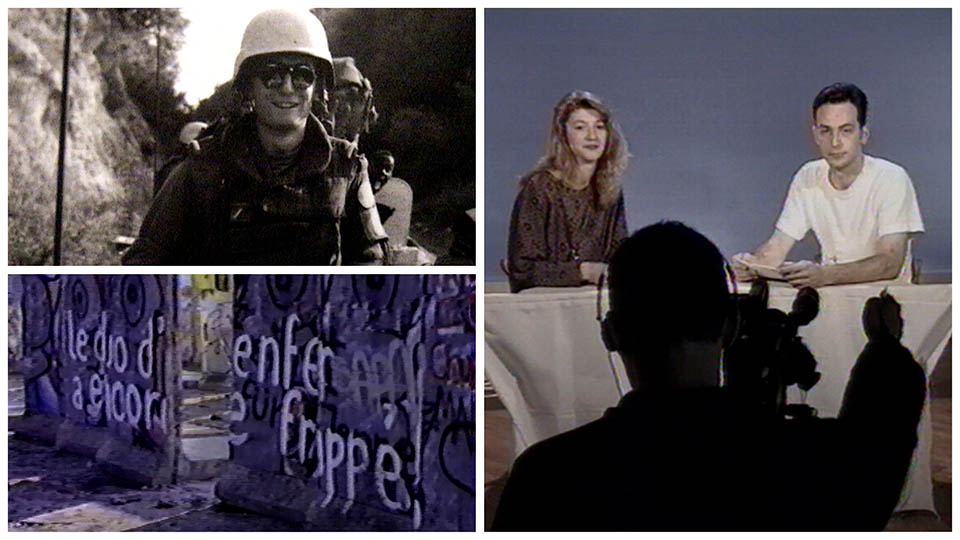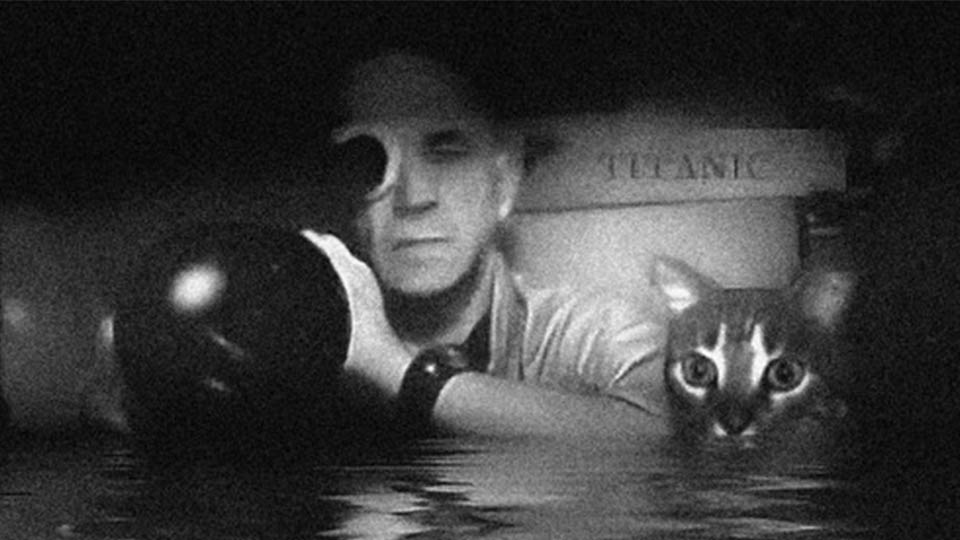Virtual Cinema
Chris Marker’s Shorts

$10 Regular
$8 for Members (not a member?)
Virtual Screening Available In the USA
Available Friday, July 30 – Thursday, October 21
In order to commemorate Chris Marker’s centenary (July 29) we’ve assembled together with Icarus Films, some of the French filmmaker’s never-before-released shorts—BERLINER BALLADE, PRIME TIME IN THE CAMPS, and BLUE HELMET.
BERLINER BALLADE – In 1990, after the fall of the Berlin Wall, the France 2 news show Envoyé spécial sent Chris Marker to East Berlin in the lead-up to the first free elections in decades. BERLINER BALLADE is the film Marker made, but the program which commissioned it never aired it in its entirety. Marker takes us onto the streets of Berlin—showing crowds of pedestrians, sausage vendors, even people creating fake Berlin Wall souvenirs to sell. He juxtaposes these images with archival footage of the wall and its surroundings, Hitler in a triumphant motorcade, and a stark row of crosses bearing the names (when known) and date of death of those killed trying to cross over into East Germany. The film is punctuated with short interviews featuring artists and activists grappling with what life in this new Germany means for the left. Jutta Braband, later elected to the Bundestag, is frustrated by other activists’ hesitancy to even speak of “the left” as a force anymore. Author Stephan Hermlin says, given the choice between “fascist barbarism and Stalinist barbarism” he chose the latter. Now, he says, a better society lies in the future, but “very far from us.” Still, there is clearly hope among those who cast their ballots on election day. As the votes are tallied, the Christian Democrats carry the day. It is the start of a new reality for Berliners, and one many clearly greet with mixed feelings.
PRIME TIME IN THE CAMPS – Housed in a the Roska refugee camp – a former military barracks – Bosnian refugees find themselves cut off from their former lives, and from the rest of the world. It is 1993, and as the Yugoslav war rages and the siege of Sarajevo drags on, a group of young people decide to break the isolation by making their own television programs. A Belgian NGO provides them with gear, and they pirate satellite feeds from different sources, edit the footage, and assemble a news program complete with co-hosts. In the process, they learn about the biases of different outlets, and commit to presenting the news as fairly as possible. They also interview residents of the camp in a moving weekly special report feature “interview from a room” feature. And some of them work on a longer-term project, using video to preserve memories – a critical consideration, since so many keepers of stories have been killed. The programs are recorded on videocassette and “air” on a tiny TV in a packed screening room at the camp. PRIME TIME IN THE CAMPS is one of a series of Chris Marker’s short films on the war in Yugoslavia. Featuring behind-the-scenes footage of the camp’s TV crews in action, with interviews and excerpts from the TV programs, the film captures the importance of grassroots media and the need for people to share their stories.
BLUE HELMET – “People willing to listen to you for almost an hour on Yugoslavia… There aren’t many of them.” —François Crémieux. For six months in 1994, François Crémieux served as a French UN peacekeeper near the Bosnian town of Bihać. He never saw combat, barely even experienced physical discomfort—but he was left deeply shaken by the experience. In BLUE HELMET, Chris Marker keeps the focus squarely on Crémieux, an eloquent young veteran who recounts his experiences rapid-fire, as though he’s been desperate to share them since returning home. The film consists entirely of Crémieux shot in closeup, interspersed with stills from his tour of duty. The story he tells is one of infantry indifferent to peacekeeping ideals, training by racist officers, missions that range from occasionally useful to completely pointless, and rules of engagement that benefited only the aggressors. Despite its apparent simplicity, BLUE HELMET is a powerful first-hand account of a peacekeeping mission that didn’t just go wrong, but never had any opportunity to go right.
In French and English, with English subtitles.
-
Genre
Documentary, French Cinema, Historical Interest, War & Conflict, Shorts Program, Subtitled, Journalism
Director
Chris Marker
Producer
Chris Marker
Country
France

